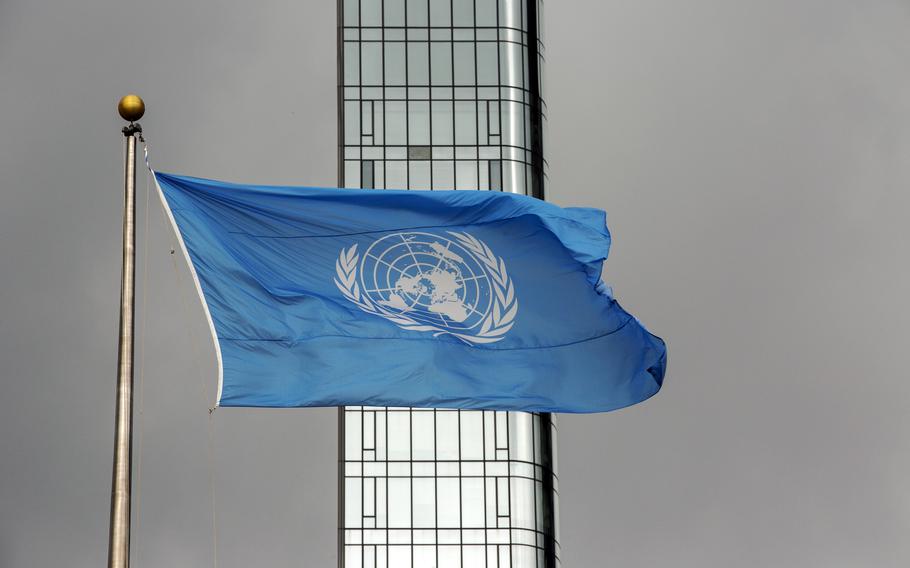
The U.N. flag flies on a stormy day at the United Nations during the United Nations General Assembly on Sept. 22, 2022. (Ted Shaffrey/AP)
UNITED NATIONS — The U.N. Security Council voted unanimously on Thursday to terminate the U.N. peacekeeping force in southern Lebanon at the end of next year after nearly five decades, bowing to demands from the United States and its close ally Israel.
The United States, which initially demanded the force be ended in six months and later sought a one-year final extension, voted in favor of a final 16-month mandate to continue its activities near Lebanon’s U.N.-drawn border with Israel.
The multinational peacekeeping force has played a significant role in monitoring the security situation in southern Lebanon for decades, including during the Israel-Hezbollah war last year. But it has drawn criticism from both sides and officials in President Donald Trump’s administration, which has moved to slash U.S. funding for the operation as the Republican president remakes America’s approach to foreign policy.
“The security environment in Lebanon is radically different than just one year ago, creating the space for Lebanon to assume greater responsibility,” acting U.S. Ambassador Dorothy Shea said.
Peacekeeping force is winding down after border clashes
The peacekeeping force, known as UNIFIL, was created to oversee the withdrawal of Israeli troops from southern Lebanon after Israel’s 1978 invasion. Its mission was expanded following the monthlong 2006 war between Israel and the militant group Hezbollah.
Following last year’s Israel-Hezbollah war, Lebanese officials have called for UNIFIL to remain, saying the country’s cash-strapped and overstretched army is unable to patrol the full area on its own.
Lebanese Prime Minister Nawaf Salam welcomed the decision to extend UNIFIL’s mandate until December 2026 and thanked “all friendly countries in this Council that expressed their understanding of Lebanon’s concerns.”
The U.N. resolution, sponsored by France, gives the force a year starting on Dec. 31, 2026, to withdraw its 10,800 military and civilian personnel and all U.N. equipment. During this period, UNIFIL was authorized to carry out a few limited activities.
The resolution says the aim is to make the Lebanese government “the sole provider of security” in southern Lebanon north of the U.N.-drawn border with Israel known as the Blue Line. It calls on Israel to withdraw its forces from north of the Blue Line.
Trump administration pushed for end to UNIFIL
Trump administration political appointees had sought to shut down UNIFIL as soon as possible and secured major cuts in U.S. funding. They regard the operation as a waste of money that is merely delaying the goal of eliminating Hezbollah’s influence and restoring full security control to the Lebanese armed forces.
European nations, notably France and Italy, objected to winding down UNIFIL too quickly. They argued that ending the peacekeeping mission before the Lebanese army was able to fully secure the border area would create a vacuum Hezbollah could easily exploit.
France’s deputy U.N. ambassador, Jay Dharmadhikari, welcomed the unanimous vote, saying last November’s cessation of hostilities between Israel and Hezbollah placed Lebanon on a path to regain sovereignty over its entire territory and toward regional stability.
He said UNIFIL’s ongoing operations are still vital, stressing that its mandate until the end of 2026 will give the force “precious time … to work alongside the mounting capabilities of the Lebanese arm so that sovereignty can be extended throughout Lebanese territory.”
Dharmadhikari warned that “any premature withdrawal could undermine or even weaken” that effort.
The U.S. commended the progress of deployment of Lebanese forces, Shea said, and will keep working with it “to expand its capabilities as Lebanon carries out its critical work in disarming Hezbollah.”
She urged the international community to use the coming year to bolster the Lebanese armed forces and “set Lebanon up for success.”
Some fear for the stability of the region when peacekeepers depart
Algeria’s U.N. Ambassador Amar Bendjama, the Arab representative on the Security Council, stressed that UNIFIL “remains indispensable to stability in Lebanon and in the region” by playing a key role in deescalating tensions, in supporting the cessation of hostilities, and in enabling Lebanese forces to deploy in the south.
Saying Israeli forces are still in Lebanon in violation of past agreements, Bendjama warned that “without ending Israel’s occupation of Arab lands, peace and stability in the region will remain elusive.”
During the one-year withdrawal period, the resolution says, UNIFIL is authorized to provide security and assistance to U.N. personnel, “to maintain situational awareness in the vicinity of UNIFIL locations,” and to contribute to the protection of civilians and the safe delivery of humanitarian aid “within the limits of its capacities.”
The resolution urges the international community “to intensify its support, including equipment, material and finance” to the Lebanese armed forces.
Associated Press writer Abby Sewell in Beirut contributed to this report.